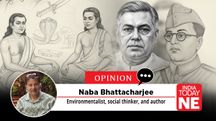Nudge Theory: The subtle art of steering better choices
Nudge theory basically questions the standard economic assumption that people decide by making a critical assessment of all given information.
 Nudge Theory: The subtle art of steering better choices
Nudge Theory: The subtle art of steering better choicesEach human's success is dependent on one crucial ability—the ability to make the right choice at the right time. In the world of economics, nudges help you make better choices; it helps you in developing a mindset that will benefit you in your future choices. Developed by Richard H. Thaler and Cass R. Sunstein in their book, “Nudge: Improving Decisions About Health, Wealth, and Happiness,” Nudge Theory is a closer look at how differences in choices can significantly affect choices and behaviors in people’s lives. Instead of influencing people to make rigorous choices, nudge steers people to make more rational choices. This theory combines insights from psychology with economic principles.
Nudge theory basically questions the standard economic assumption that people decide by making a critical assessment of all given information. It recognizes instead that heuristics—or simple rules of thumb or mental shortcuts—are used to arrive at decisions, which often might lead to irrational or wrong choices. The thing is, people do not save enough for retirement or make poor food choices often enough, not because they want to do so, but due to the framing of options or presentation.
One of the most important notions in the theory of nudges is a "default option." A default would be a preselected choice that will be applied automatically unless the individual actively chooses another one. Studies have verified that most people remain with the default since altering defaults requires some degree of labor. This principle could be cleverly utilized in a couple of fields. For instance, most retirement savings plans automatically enroll employees but present them with an opportunity to opt out. Researchers have told of how automatic enrollment raises participation many-fold compared with when employees needed to actively decide to join the plan. By making saving the default option, for example, people are pushed toward a superior financial outcome but are not pressured to explicitly decide to save.
Another very common type of nudge involves the use of social norms. Social norms are unwritten rules that indicate the ways in which people are commonly expected to behave. Appealing to such norms can affect behavior in subtle yet powerful ways. Messages such as "most people in your community recycle" or "most guests reuse their towels" might get people to recycle or reuse towels. This nudge works because many people look to others for cues on how to behave and want to act in concert with what they perceive as the norm.
Nudge theory also applies to health and wellness. Something as simple as the way choices of food are presented makes all the difference. In a cafeteria setting, if fruits and vegetables are put at eye level and less healthy options remain out of sight, then people are more prone to make healthier food choices. Also, in a dining setting, smaller plates can control portion sizes and reduce overeating. These nudges take advantage of the tendency of people to make decisions based more on ease and ambient surroundings, rather than based on a reflective and conscious matching of options against options.
These nudges can also be applied within the realm of public policy to encourage behaviors that are positive, thus improving socially desirable outcomes. Other examples are reminders to vote or pay taxes in a timely manner in order to raise participation rates. Other applications involve environmental policy; signs reminding people to conserve energy or recycle can be used as nudges toward environmentally cleaner behavior. By making desired behavior more ethical and accessible, nudges help individuals make choices that better align with broader social goals.
One of the most significant benefits of nudges is that they retain individual freedom of choice. Unlike regulations or instructions, nudges do not force people to make certain decisions. Instead, they encourage people toward better decisions in a soft way: by changing the choice architecture—that is, how options are presented and arranged. This approach respects personal autonomy while still encouraging beneficial behaviors.
However, the application of nudges is not without its own set of obstacles and controversial ethical issues. One concern here is manipulation. Because nudges work at the level of influencing choices in subtle ways, it could be that they might be used in ways that favor the outcome over and above individual well-being and autonomy. For example, fraud marketing policies to nudge consumers into purchasing certain products benefit the companies but harm consumers. It is, therefore, very important that nudges be transparently and constructively designed so as not to take unfair advantage of the people but rather serve in the best interest of the same people.
Another issue concerns the more general effectiveness of nudges and, more importantly, their generalizability. While many studies indicate their impact, it is not always decisively strong. More detailed design or context may lead to different effectiveness. What works in one situation or population might not work in another. Such variability underlines the importance of tailoring nudges to the needs and characteristics of a specific audience and continuous assessment of their effects.
In a nutshell, nudge theory provides a perfect framework for conceptualizing how insignificant changes in the presentation of choices can bring about significant changes in behavior. By bringing insights from behavioral science into nudges, policymakers have been given a powerful tool to improve decision-making related to issues such as personal finance and public health. Where nudges do not interfere with individual freedom and autonomy, their implementation should be done in such a way that they ethically and thoughtfully assist the choices being made and do not manipulate them. As our knowledge of behavioral economics continues to evolve, nudges will probably remain an important tool in the illumination of policies and practices that contribute toward well-being and facilitate better decision-making in society.
Copyright©2026 Living Media India Limited. For reprint rights: Syndications Today









